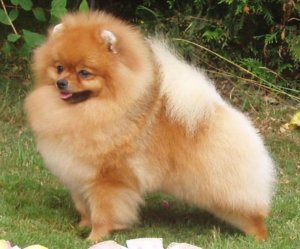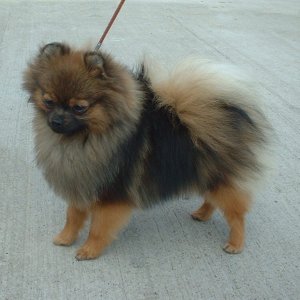Pomeranian

Profile
The small frame of the Pomeranian barley holds the large ego this feisty dog possesses. The spunky attitude of the Pom gives this dog a fun and entertaining personality. This dog provides the family with a fun atmosphere because of its animated and amusing personality. This type of dog is always alert and prepared for the next move, the Pomeranian is especially ready for any action in the house. This breed usually has a very outgoing attitude and it sometimes has a frisky temperament. With thier energetic personality, it is easy for them to feel they are the leader of the pack and display leadership traits, which can include excessive barking or negative attitude actions.
Appearance
Typically, a Pomeranian body is small in structure and has a short back line. In fact they are known as one of the smallest types of dogs in the world. The body is compact and the tail is curled up toward to back. The fur on the head is smooth and flat own, and has a short pointed snout. The head resembles a fox and the ears are pointed on the top of the head also similar to a fox. The average Pomeranian dog should only weigh up to 7 pounds and as low as 3 pounds, for an adult dog.
The fur of the Pomeranian is double-coated. The fur consists of two parts, the under coat called is thick and fluffy, keeping the dog warm. The outer coat is long hair that is coarsely textured and is much longer than the undercoat. The fur of the Pomeranian is thick and full and is fluffed up in preparation for breed showing competitions. The fur around the neck is full and resembles a mane of a lion, and the long hair continues down the back of the dog. The fur on the legs is short like the hair on the dog's face.
Care
The average life expectancy is roughly 12 to 18 years of age, and the health problems are low if taken care of well throughout their lives. The average Pomeranian dog has an average susceptibility of gaining any illness. Hip dysplacia and other bone a joint problems are less likely in this breed of dog because of its light weight frame.
Pomeranians are a perfect fit for dog lovers who live in apartments. A Pomeranian can live in tight living quarters because they are so small, but that is not to say they need any less exercise than any other dog. Pomeranian’s need daily walks, especially if you do have a small living area. If daily walks are taken, it will help maintain any negative behavioral issues.
Pomeranians should be fed with dry dog food to help prevent any tooth loss. These dogs are also more susceptible to overheating due to their furry disposition. They are also tolerant of cold weather conditions
The thick coat of the Pomeranian needs special care in order the ensure the dog does not get mats that can lead to infection and irritation. The fur needs to be brushed frequently, and should be brushed toward the head in sections. The reason the fur is so thick is because of the heavy undercoat, which sheds twice a year on average. The Pomeranian has special needs that must be followed to make sure you dog is always happy and healthy.
Since Pomeranians tend to have a dominant personality, early training is critical. If not trained, the dogs could create a nuisance. However, the breed is usually known for being curious and energetic. They are curious yet alert. While some may think the breed is over chatty or clingy, this type of canine stands out among the rest. Their small size doesn't stop their big personalities, in some cases you can spot them taking on dogs that are four times their size!
History
The history of this breed dates back to the 1800s. The breed is believed to be a descendant of the famous Spitz family dogs. These are sled dogs that come from Lapland and Iceland, brought to Europe from the region of Pomerania, hence the name Pomeranian. The region of Pomerania is now a region covered by both Poland and Germany.
Queen Victoria created a kennel to breed Pomeranians in the 1800's. The queen wanted to develop a breed that was smaller in size. Originally, these dogs weighed upwards of 30 pounds. Nowadays they are usually 4-5 pounds. These dogs are well known for their agility and ability to perform tricks due to their small size. They continue to be competitive show dogs but can also be fun loving domesticated pets as well.

Return from Pomeranian to Dog-Breeds-Explorer Homepage